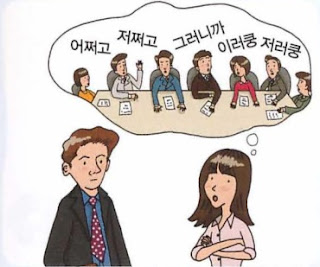가: 어제 회의에서는 어떤 결론이 났나요?
What kind of conclusion was reached at yesterday’s meeting?
나: 결론은요. 다들 남의 의견은 듣지 않고 자기 이야기만 하려고 드니 결론이 날 리가 있나요. 다음 주에 다시 회의를 하기로 했어요.
Conclusion? Is there any way a conclusion can be reached when every person says what is on his mind and never listens to the opinions of others? We decided to meet again for another meeting next week.
가: 조금만 서로 양보하면 될 텐데 말이에요.
If only each side would yield just a little bit.
나: 그러게요. 서로 조금이라도 손해는 보지 않으려고 드니 의견 일치가 안 될 수밖에요.
You’re right. Everyone is so set on not giving up even an inch, so there’s no way for any kind of consensus to be reached.
-(으)려고 들다 is used to indicate the subject’s strong, active effort to achieve some aim or purpose. It is also used in the form -(으)려 들다, in which 고 is omitted. It only attaches to verbs.
우리 남편은 건강에 좋다는 음식은 무조건 다 사려고 들어요.
My husband is always determined to buy only healthy foods.
무슨 일이든지 과정도 중요하니까 결과만으로 평가하려 들지 마세요.
No matter what it is, the process is also important, so don’t judge based solely on the end result.
온 국민이 함께 이 어 려운 상황을 극복하려고 들면 못 할 일이 어디 있겠어요?
As long as every citizen strives to overcome this difficult situation, there’s nothing we can’t overcome.
The particle 만 can be added to this expression to add additional emphasis. In such cases, the form -(으)려고만 들다 is used with verbs and adjectives while the form 만 -(으)려고 들다 is used with nouns.
• 방학이라고 공부는 안 하고 하루 종일 놀려고만 든다.
• 우리 딸아이는 이렇게 추운 날씨에도 짧은 치마만 입으려고 든다.
> You can click on the title of each grammar below to see other grammar which also expresses ‘Intention’
>> Full of ‘Korean grammar in use – Advanced’: Click here
>> Follow my page to get Korean lessons: Say Hi Korean

